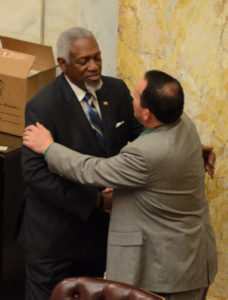© 2018 by Steve Brawner Communications, Inc.
Visitors to the Arkansas Capitol this January 15 won’t see a sign saying the building will be closed to honor Dr. Martin Luther King and Gen. Robert E. Lee.
This year, the holiday will be King’s alone.
Legislators voted last year to separate the days. The third Monday in January will be Martin Luther King Jr. Day. Robert E. Lee will be acknowledged on the second Saturday in October with a “state memorial day,” not a holiday. The law also requires schools to develop teaching materials about the Civil War and the civil rights struggle.
How the holidays were combined
The state originally combined the two holidays in 1985, two years after King’s birthday was made a federal holiday. Lee’s Jan. 19 birthday had been made an Arkansas state holiday in 1947, which meant state employees enjoyed two paid vacations only days apart. Combining the days reduced that to one.
Right or wrong, it also looked like Arkansas didn’t want to give the civil rights leader his own holiday. Last year, Arkansas was one of three former Confederate states that honored both men on the same day. The others were Mississippi and Alabama.
For some, that stung. Sen. Joyce Elliott, D-Little Rock, grew up attending segregated schools in Willisville in Nevada County and then finished her education at what had been an all-white school. In a committee meeting last year, she said of that annual Capitol door posting, “Every time I see it, every year I see it, it’s like a stab in the heart … it’s a hurtful thing, and every year we get to relive it.”
An effort to separate the days blew up in the 2015 legislative session amidst vocal opposition from constituents and Confederate history buffs. That year, Hutchinson, who was newly elected, didn’t offer a strong opinion at the beginning of the session and only quietly supported the separation by the end. Then in July of that year, he wrote the state NAACP president that he would “do what is in my power” to give King his own day.
A tough, emotional debate
Last year, he made it a top priority, personally testifying before legislative committees for the first time as governor. He told the Senate Education Committee that his great-great-grandfather, Col. Alexander Simpson Hutchinson of Nashville, Ark., fought for the Confederacy. He brought as a prop an oversized copy of that Capitol door notice.
The debate was emotional and tense. On the floor of the House of Representatives, one legislator said it seemed the state was ashamed of its past, while another wondered if the next step would be removing the star in Arkansas’ flag representing its participation in the Confederacy.

That’s when Rep. George McGill, D-Fort Smith, stepped to the podium and calmed the waters. In an impromptu speech, he praised one of the bill’s opponents, talked about his great-great-grandfather serving as a Union soldier, and recalled his own experiences as a black student at the University of Arkansas, where he was denied a dormitory room because of his skin color. He’d been an angry young man then, and he’d promised never to return to that campus. Now, he said, it’s “one of my favorite places to go.” He said the law would be just another piece of paper stuck in a binder, but it would give educators a way to talk about the past.
The bill passed 66-11, with 18 not voting and 5 voting present. The opponents had their reasons, but the speech turned what could have been a divisive moment into a healing one.
“I sensed the tension in the room. It was not healthy, and I was just led to say something,” McGill said at the bill signing.
So this year, there will be no more debate pitting M.L.K. versus R.E. Lee, of which everyone should be glad. King’s dream wasn’t about whose name would be on a closed door, anyway, but about which doors would be open to all.
Related: Blessed is the peacemaker.
